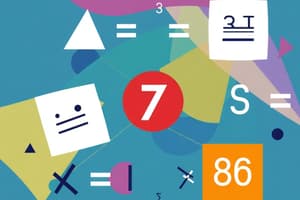Podcast
Questions and Answers
What is a fundamental operation used to analyze sets?
What is a fundamental operation used to analyze sets?
- Regression analysis
- Union (correct)
- Maximization
- Algorithmic processing
Which branch of mathematics studies properties of integers and prime numbers?
Which branch of mathematics studies properties of integers and prime numbers?
- Number Theory (correct)
- Set Theory
- Linear Algebra
- Abstract Algebra
In propositional logic, which of the following is not a connective?
In propositional logic, which of the following is not a connective?
- Or
- And
- Thus (correct)
- Not
What distinguishes discrete mathematics from other fields of mathematics?
What distinguishes discrete mathematics from other fields of mathematics?
Which of the following concepts is crucial for real analysis?
Which of the following concepts is crucial for real analysis?
Which branch of mathematics focuses on the study of shapes and spatial relationships?
Which branch of mathematics focuses on the study of shapes and spatial relationships?
What is a key property governing arithmetic operations?
What is a key property governing arithmetic operations?
Which of the following is a technique used to solve quadratic equations?
Which of the following is a technique used to solve quadratic equations?
Which of the following types of numbers is fundamental in arithmetic?
Which of the following types of numbers is fundamental in arithmetic?
What does calculus primarily deal with?
What does calculus primarily deal with?
Which statistical measure describes the center of a data set?
Which statistical measure describes the center of a data set?
What is an essential component of calculus?
What is an essential component of calculus?
What type of equations does algebra introduce that involves unknown quantities?
What type of equations does algebra introduce that involves unknown quantities?
Flashcards
Set
Set
A well-defined collection of distinct objects, called elements.
Logic
Logic
The study of correct reasoning using statements and arguments to determine validity and truth.
Discrete Mathematics
Discrete Mathematics
A branch of mathematics dealing with distinct and separate objects, including graph theory, combinatorics, and logic.
Number Theory
Number Theory
Signup and view all the flashcards
Abstract Algebra
Abstract Algebra
Signup and view all the flashcards
What is Mathematics?
What is Mathematics?
Signup and view all the flashcards
What is Arithmetic?
What is Arithmetic?
Signup and view all the flashcards
What is Algebra?
What is Algebra?
Signup and view all the flashcards
What is Geometry?
What is Geometry?
Signup and view all the flashcards
What is Calculus?
What is Calculus?
Signup and view all the flashcards
What is Statistics?
What is Statistics?
Signup and view all the flashcards
What is an Equation?
What is an Equation?
Signup and view all the flashcards
What is a Variable?
What is a Variable?
Signup and view all the flashcards
Study Notes
Fundamental Concepts
- Mathematics is a formal system of logic used to study quantities, structures, space, and change.
- It uses symbolic language to represent and manipulate abstract concepts.
- Key branches include arithmetic, algebra, geometry, calculus, and statistics.
- Mathematics is used in various fields, including science, engineering, computer science, and finance.
Arithmetic
- Arithmetic deals with basic operations on numbers such as addition, subtraction, multiplication, and division.
- It forms the foundation for more advanced mathematical concepts.
- Properties such as the commutative, associative, and distributive laws govern arithmetic operations.
- Integers, fractions, and decimals are fundamental types of numbers in arithmetic.
Algebra
- Algebra extends arithmetic by introducing variables and equations.
- Variables represent unknown quantities or values.
- Algebraic equations are used to solve problems and model relationships between variables.
- Techniques for solving equations, such as factoring, completing the square, and using the quadratic formula are vital.
- Linear equations, quadratic equations, and systems of equations are common types of algebraic expressions.
Geometry
- Geometry studies shapes, sizes, and spatial relationships.
- It involves concepts like points, lines, planes, angles, and polygons.
- Euclidean geometry deals with flat surfaces and shapes, while non-Euclidean geometry explores other geometries, like spherical geometry.
- Fundamental shapes like triangles, quadrilaterals, circles, and other polygons are essential.
- Properties of shapes like area, perimeter, volume, and angle relationships are key concepts.
Calculus
- Calculus deals with continuous change and motion.
- It involves limits, derivatives, integrals, and differential equations.
- Derivatives measure rates of change, while integrals find accumulated quantities.
- Applications are vital in physics, engineering, and economics in modeling growth, decay, and other processes.
- Concepts of differentiation and integration form core components.
Statistics
- Statistics deals with the collection, organization, analysis, interpretation, and presentation of data.
- It involves probability and distributions.
- Descriptive statistics summarize data, while inferential statistics analyzes from samples to draw conclusions about populations.
- Measures of central tendency (mean, median, mode) and variability (variance, standard deviation) are crucial.
- Statistical methods are applied in decision-making in various fields.
Sets
- A set is a well-defined collection of distinct objects, called elements.
- Sets are foundational to many mathematical concepts and theories.
- Set operations like union, intersection, and complement are used to combine and analyze sets.
- Sets can be finite or infinite.
Logic
- Logic is the study of correct reasoning.
- It uses statements and arguments to determine validity and truth.
- Propositional logic deals with statements using connectives like "and", "or".
- Predicate logic deals with statements with variables and quantifiers.
Discrete Mathematics
- Discrete mathematics deals with objects that are distinct and separate.
- It includes graph theory, combinatorics, and logic.
- Useful in computer science and other fields where data is discrete.
Number Theory
- Number theory studies the properties of integers, prime numbers, and other number systems.
- Concepts of divisibility, congruences, and modular arithmetic are key in this field.
Abstract Algebra
- Abstract algebra examines abstract algebraic structures like groups, rings, and fields.
- It explores the general properties and relationships within these structures.
Real and Complex Analysis
- Real analysis focuses on real numbers and their properties.
- Complex analysis expands on these principles to include complex numbers.
Linear Algebra
- Linear algebra deals with linear equations, vector spaces, and matrices.
- Crucial for various applications in science, engineering, and computer science.
Studying That Suits You
Use AI to generate personalized quizzes and flashcards to suit your learning preferences.
Description
This quiz covers the fundamental concepts of mathematics, focusing on branches such as arithmetic, algebra, geometry, calculus, and statistics. It explores basic operations and the properties of numbers alongside the role of mathematics in various fields. Test your knowledge on these foundational ideas and their applications!



